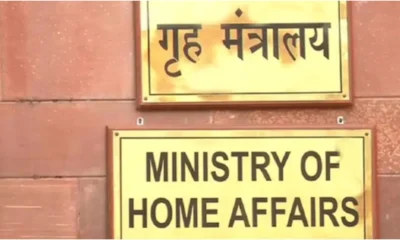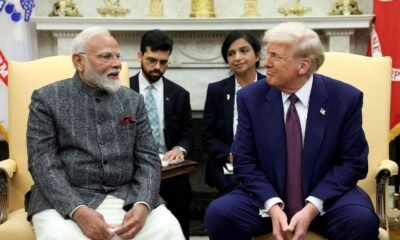Travel Guides & Articles
Guru Nanak’s birth aniv: Centre denies Sikh jatha permission to visit Pakistan

The Union government has refused permission to send a Sikh jatha (group of pilgrims) to Pakistan for Sikhism’s founder Guru Nanak’s Parkash Parb in November this year, citing security concerns.
The Shiromani Gurdwara Parbandhak Committee (SGPC) had started the process earlier this year in July, gathering passports of intending devotees and sending applications to the Pakistan high commission in New Delhi for the necessary visas for the 10-day pilgrimage. However, in a letter sent to the chief secretary of Punjab and other neighbouring states, the Union ministry of home affairs stated that the current security situation between India and Pakistan made it unsafe for pilgrims to travel.
{{^usCountry}}
{{/usCountry}}
“Considering the prevailing security scenario with Pakistan, it would not be possible to send the Sikh pilgrims’ jatha to Pakistan on the occasion of Sri Guru Nanak Dev Ji’s Gurparb in November 2025. We request that Sikh organisations in your state are informed and that the processing of jatha applications is stopped immediately,” reads the letter, dated September 12, sent by the under secretary of the Union ministry of home affairs to the chief secretary of Punjab and other neighbouring states.
{{^usCountry}}
The Union government’s refusal to permit the Sikh jatha follows a series of security-related travel restrictions. The SGPC was unable to send pilgrims to Pakistan for the death anniversary of Maharaja Ranjit Singh in June this year due to similar concerns.
{{/usCountry}}
{{#usCountry}}
The Union government’s refusal to permit the Sikh jatha follows a series of security-related travel restrictions. The SGPC was unable to send pilgrims to Pakistan for the death anniversary of Maharaja Ranjit Singh in June this year due to similar concerns.
{{/usCountry}}
After the Pahalgam terror attack in April this year, which claimed the lives of 26 people, the Union government tightened travel restrictions, barring Indian citizens from travelling to Pakistan through the Attari-Wagah border checkpost. In response, Pakistan suspended all SAARC Visa Exemption Scheme (SVES) visas for Indian nationals, with the exception of Sikh pilgrims.
SGPC condemns move
The decision has sparked outrage, with SGPC president Harjinder Singh Dhami condemning the government’s refusal. “This decision is an insult to the religious sentiments of Sikh pilgrims. While cricket matches are being played between India and Pakistan, pilgrims wishing to visit their religious shrines are being denied this right in the name of security,” Dhami said.
He appealed to the Union government to reconsider the decision, pointing out that the Sikh pilgrimage to Pakistan has been a long-standing tradition, with Sikh jathas visiting Pakistan for Guru Nanak’s birth anniversary for decades. “Since Partition, Indian Sikhs have been allowed to visit their religious shrines in Pakistan without interruption. This is the first time such a situation has occurred,” Dhami added.
Guru Nanak’s Parkash Gurparb is a major religious occasion for Sikhs worldwide, with many travelling to Nankana Sahib in Pakistan to pay homage at the Guru’s birthplace. The Nehru-Liaquat Pact of 1950 allows Sikh pilgrims to visit Pakistan’s sacred shrines on four key occasions — Baisakhi (Khalsa Panth foundation), Guru Arjan Dev’s martyrdom day, death anniversary of Maharaja Ranjit Singh and Guru Nanak’s birth anniversary.
In the past, thousands of Indian Sikhs have visited Pakistan for the Guru Nanak Gurpurab celebrations. In 2023, over 5,800 Indian pilgrims travelled to Pakistan’s gurdwaras to mark the Khalsa Foundation Day (Baisakhi), setting a record.
Travel Guides & Articles
A Milestone Event in Mumbai, ETHospitalityWorld

The Skal International India National Congress 2025 concluded at the Sahara Star Hotel in Mumbai on September 14, 2025.
The three-day event welcomed a record-breaking participation of more than 200 delegates, from India and abroad, all paying full congress fees to be part of this milestone gathering, said a Skal release.
Distinguished personalities including Maneka Gandhi, Shashi Tharoor, Pooja Bedi, Subhash Gha, Zayed Khani and many more lit up the moments, lending prestige, and inspiration to the occasion.
At the heart of the congress, the Annual General Meeting (AGM) for the fiscal year 2024–2025 was held on Day 1, preceded by the national board meeting.
President Sanjeev Mehra and treasurer Monik Dharamshi presented transparent reports on finances and activities. Delegates appreciated the clarity of leadership, as the roadmap for Vision 2025–2030 that was shared, laying out strategies to strengthen Skal’s footprint in India and deepen global engagement.
“This congress is not just about numbers; it is about values, vision, and vitality. We are proud to host Skålleagues from across India and abroad to Mumbai, to celebrate the true spirit of friendship, collaboration, and business networking that Skal stands for,” said Mukesh Batra, president, Skal International Mumbai South, the host club.
For the first time, Skal International India national board launched the Skal International Indian Excellence Awards 2025, designed to recognise outstanding contributions from clubs, individuals, and Friends of Skål. The awards celebrated the achievements in club performance, membership growth, innovation, sustainability, and community impact.
The award for best performing Indian Skal Club of the Year 2025 was won by Skal International Chennai; Best active Indian Skal Club of the Year 2025 was won by Skal International Goa; Fastest growing Indian Skal Club of the Year 2025 by Skal International Bangalore; Best Indian Skål Club Event of the Year 2025 was jointly presented to Skal International Kolkata and Skal International Jammu & Kashmir; Best Indian Skal Club CSR of the Year 2025 award went to Skal International Coimbatore; Recognition as a reckoning force to Skal International Kochi; Recognition for outstanding young Skal engagement to Raja Gopal Iyer, Skal International Trivandrum; Indian Skalleague of the Year 2025 to Kamleshwaran P.S., Skal International Chennai; and Recognition for global outreach to N.S.N. Mohan, deputy vice president and director of Region 10, Skal International.
“The Excellence Awards are not merely trophies; they are a tribute to dedication, creativity, and the unwavering spirit of Skålleagues who are driving this movement forward. Our board’s vision for 2025–2030 is rooted in collective growth: more clubs, stronger retention, deeper engagement, and a unified Indian presence on the world stage,” said Sanjeev Mehra, president, Skal International India. “
Travel Guides & Articles
Tharoor calls for targeted campaigns beyond ‘Incredible India’ to boost tourism

Calling for a more nuanced and diversified promotional strategy, Dr Shashi Tharoor, Member of Parliament, has urged India’s tourism sector to move beyond the singular “Incredible India” campaign and adopt a more segmented approach to marketing the country’s vast and varied offerings. He emphasised the need to highlight niche sectors such as wildlife, beaches, heritage, and culture, arguing that a one-size-fits-all campaign is insufficient to reflect India’s diversity. “One ‘Incredible India’ campaign is not enough,” Tharoor said. “We need to showcase the many different aspects of India that exist within our borders.”
Speaking at the Skål India National Congress 2025 in Mumbai, he also pointed to the glaring absence of Chinese tourists in the country, despite their growing presence in global tourism. “The Chinese are travelling across the world except India. Let’s bring some Chinese money into our country,” he remarked.
Adding a touch of humour to his address, Tharoor quipped, “Perhaps we could even attract some British tourists for a colonial heritage tour—though there aren’t many monuments left; they took more than they left.”
His remarks added both insight and levity to a serious discussion on revitalising Indian tourism, offering clear and actionable ideas to industry leaders and policymakers alike.
Tharoor also called for urgent structural reforms in the tourism sector, highlighting the need to enhance women’s safety and strengthen hospitality infrastructure across the board. “Our nation carries the perception that India is not safe for women. We must change this image. It’s time for action. Increasing the presence of women police officers in tourist areas would be a step in the right direction,” he stated.
He emphasised tourism’s role as a key driver of economic growth, citing its potential to create employment and generate significant revenue. “We have a lot to do. Tourism is a vital sector—it generates jobs and enhances government income. Infrastructure development must be prioritised.”
Pointing to gaps in the current hospitality ecosystem, he added, “We either have high-end five-star hotels or substandard facilities—there’s virtually nothing in the middle. We need to build a lot more to fill this gap.”
Tharoor’s address reflected a mix of strategic insight and wit, resonating with tourism professionals, investors, and policymakers seeking to position India as a more attractive and accessible global destination.
Travel Guides & Articles
Where to Shop for Jewelry in Jaipur, India

From left: Courtesy of Santi; Abhishek Bali
Jaipur has long seduced travelers with its warren of old bazaars, royal palaces, and glittering treasures. But behind one of the city’s pink façades lies a rarer find: Royal Gems & Arts, a jewelry business housed inside Saras Sadan, an 18th-century haveli, or mansion, a short walk from the iconic Hawa Mahal palace.
Run by ninth-generation jeweler Santi Choudhary with his wife, Shobha, and son, Krishna, the atelier feels like a museum and is open by appointment only. The Choudharys, descendants of the city’s founding families, supply exquisite pieces to royalty and collectors around the world.
Today, Santi oversees a trove of Mughal- and Rajput-inspired pieces, some of which have been loaned to the world’s top museums. Krishna joined the family business while studying Islamic and Indian art in London. In 2019, he started his own label, Santi, with an atelier in London’s Mayfair district showcasing bold, contemporary designs with rare stones set in gold, titanium, or platinum.
Together, the Choudharys’ shops offer a glimpse into India’s past and present—one rooted in Jaipur’s traditions, the other reinterpreting them for a new generation. While the haveli in Jaipur focuses on heritage designs, Santi in London crafts one-of-a-kind pieces, like a rare 18th-century, pyramid-shaped Colombian emerald set in 18-karat white gold with reverse-set diamonds. “Every antique stone we work with brings a mystery with it, and we add something to it for the future,” Krishna says.
Courtesy of Santi
Run by ninth-generation jeweler Santi Choudhary with his wife, Shobha, and son, Krishna, the atelier feels like a museum and is open by appointment only. The Choudharys, descendants of the city’s founding families, supply exquisite pieces to royalty and collectors around the world.
Today, Santi oversees a trove of Mughal- and Rajput-inspired pieces, some of which have been loaned to the world’s top museums. Krishna joined the family business while studying Islamic and Indian art in London. In 2019, he started his own label, Santi, with an atelier in London’s Mayfair district showcasing bold, contemporary designs with rare stones set in gold, titanium, or platinum.
Together, the Choudharys’ shops offer a glimpse into India’s past and present—one rooted in Jaipur’s traditions, the other reinterpreting them for a new generation. While the haveli in Jaipur focuses on heritage designs, Santi in London crafts one-of-a-kind pieces, like a rare 18th-century, pyramid-shaped Colombian emerald set in 18-karat white gold with reverse-set diamonds. “Every antique stone we work with brings a mystery with it, and we add something to it for the future,” Krishna says.
More Must-visit Jewelers in Jaipur
Founded by Akshat Ghiya—a second-generation jeweler who was raised in India and Italy—this store has made a name for itself with its unconventional, contemporary pieces. Ghiya uses stones like pink and purple sapphire, onyx, citrine, and tourmaline to create wearable confections.
This shop, which features striking geometric styles, is attached to a museum that holds more than 2,500 objects—textiles, coins, daggers, and jewelry—collected by the owners’ late father.
Established in 1852, this store is a celebrity favorite. Princess Diana, Oprah, and Gwyneth Paltrow have all ogled the traditional Indian craftsmanship blended with contemporary design. After the eighth-generation jeweler Munnu Kasliwal died in 2012, his son Siddharth took over, and today runs the business alongside his brother, cousins, and uncle.
A version of this story appeared in the October 2025 issue of Travel + Leisure under the headline “Jaipur’s Crown Jewel.”
-

 Business3 weeks ago
Business3 weeks agoThe Guardian view on Trump and the Fed: independence is no substitute for accountability | Editorial
-
Tools & Platforms1 month ago
Building Trust in Military AI Starts with Opening the Black Box – War on the Rocks
-

 Ethics & Policy2 months ago
Ethics & Policy2 months agoSDAIA Supports Saudi Arabia’s Leadership in Shaping Global AI Ethics, Policy, and Research – وكالة الأنباء السعودية
-

 Events & Conferences4 months ago
Events & Conferences4 months agoJourney to 1000 models: Scaling Instagram’s recommendation system
-

 Jobs & Careers3 months ago
Jobs & Careers3 months agoMumbai-based Perplexity Alternative Has 60k+ Users Without Funding
-

 Podcasts & Talks2 months ago
Podcasts & Talks2 months agoHappy 4th of July! 🎆 Made with Veo 3 in Gemini
-

 Education3 months ago
Education3 months agoVEX Robotics launches AI-powered classroom robotics system
-

 Education2 months ago
Education2 months agoMacron says UK and France have duty to tackle illegal migration ‘with humanity, solidarity and firmness’ – UK politics live | Politics
-

 Podcasts & Talks2 months ago
Podcasts & Talks2 months agoOpenAI 🤝 @teamganassi
-

 Funding & Business3 months ago
Funding & Business3 months agoKayak and Expedia race to build AI travel agents that turn social posts into itineraries





















